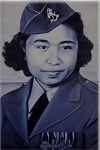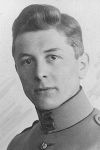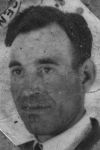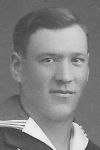Mobilisatie-Oorlogskruis (MOK)
The "Mobilisation War Cross" (Mobilisatie-Oorlogskruis - MOK) was established by Royal Decree of August 11th, 1948. The Cross can be awarded to military and former military personell having served on active duty for at least six months between April 6th 1939 until May 20th, 1940, or to those having served on active duty after May 9th, 1940 until May 19th, 1940 outside enemy territory or enemy-held territory. It can equally be awarded to military and former military personell having served on active duty for at least six months either aboard a vessel sailing under Dutch flag or aboard an aircraft, provided it served the interests of the Kingdom of the Netherlands. Finally the Cross could also be awarded to those to whom the abovementioned is not applicable but who did perform military tasks in the interest of the Kingdom of the Netherlands. If a person had previously been awarded the "Cross to Commemorate the War" (Oorlogsherinneringskruis – OHK), he or she would not be eligible for the MOK. To be eligible for the award, a person had to apply for it himself and pay a charge of Hfl 7,50.
December 1st, 1992, the decree by which this decoration was established, was revised and the previous one rescinded. From this date on, the decoration can be awarded by the Secretary of Defence. Eligible for the award is former military personnel having served the Kingdom of the Netherlands and having belonged to the Royal Dutch Navy (KM), the Royal Dutch Army (KL), the Royal Dutch Air Force (Klu), the former Royal Dutch-East Indies Army (KNIL) and personnel from the Dutch Antilles and Aruba, as well as Surinam having served on active duty. For the Netherlands, the periods between April 6th, 1939 and May 20th, 1940 were maintained for at least six months.
The second criterium was limited to those who had served outside enemy territory or enemy-held territory in the period between May 9th, 1940 and before May 19th, 1940, or after September 5th, 1944 and before May 5th, 1945. For the Dutch-East Indies, the period between December 7th, 1941 and March 9th, 1942 were added. Here, one had to have served for at least six months or had to have served in enemy territory or enemy-held territory in the period between December 7th, 1941 and March 9th, 1942. In Surinam, one had to have served for six months in the period between May 9th , 1940 and before May 54th, 1945. For the Dutch Antilles and Aruba six months of service after August 30th, 1939 and before May 5th, 1945 applies. Anywhere else in the world, the period of service must be six months in length at least and lie between August 30th, 1939 and May 5th, 1945.
The requirements for sea and aircrews have also been revised. Dutch personnel, having served for at least six months between August 30th, 1939 and May 5th, 1940 aboard a vessel under Dutch flag, outside the actual power of a hostile nation or a nation having been declared equal to such by the State were eligible provided they had served the interests of the Kingdom of the Netherlands. As far as aircrews are concerned, it pertains Dutch personnel in Dutch Civil Aviation under Dutch or Allied Command during the period between August 30th, 1939 and before September 3rd, 1945, having served for at least six months aboard an aircraft outside the actual power of a hostile nation or a nation having been declared equal to such by the State, provided they had served the interests of the Kingdom of the Netherlands.
Dutchmen, not belonging to these categories but who have performed military duties in the interest of the Kingdom of the Netherlands are eligible as well, provided they have not been awarded the War Memorial Cross (Oorlogsherinneringskruis, OHK). Bearers of the OHK are again excluded. It is not necessary for the abovementioned periods of service to be connected in time, nor do they apply to people who have been killed in action. The medal can be awarded posthumously.
The cross, designed by Frans Smits is made of bronze and consists of four arms. The diameter across the arms is 42 mm`(1.65") The arms are made in the form of the facetted points of a sword. Between the arms, two Dutch stormdaggers are depicted on a ray of beams. A Dutch helmet is depicted in the center, adourned with a laurel branch. The reverse is flat with a circular form in the center. Inside it, the words "DEN VADERLANT GHETROUWE" (Faithful to the Fatherland) are printed in relief. The ribbon is coloured violet with a narrow orange coloured band through the center.
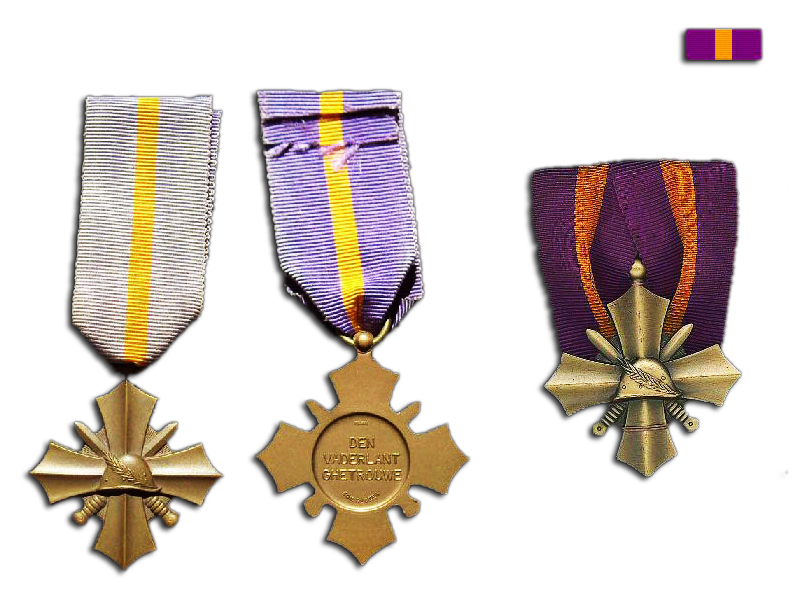
Sources
- Photo: Ministerie van Defensie (military make)/Jan Faas
- - Besluit hernieuwde vaststelling tot instelling van het Mobilisatie-Oorlogskruis, 1-10-1992, ingaand per 1-12-1992, Staatsblad 559
- The Dutch Medals Page
